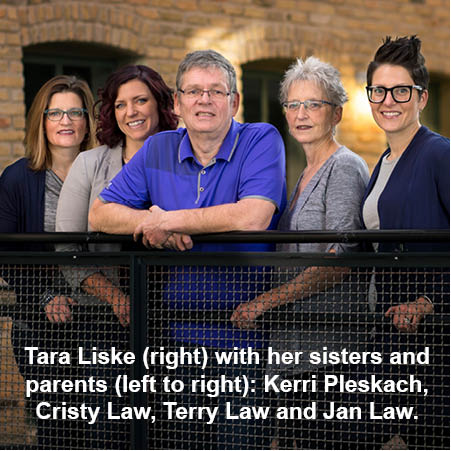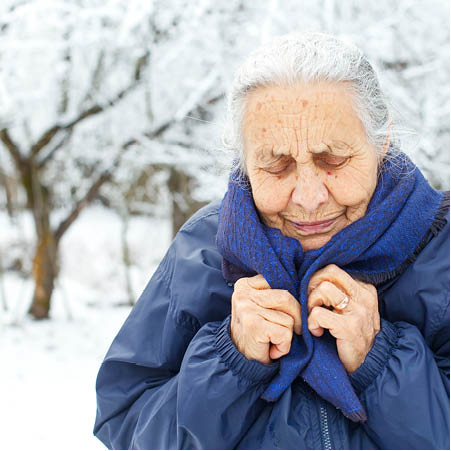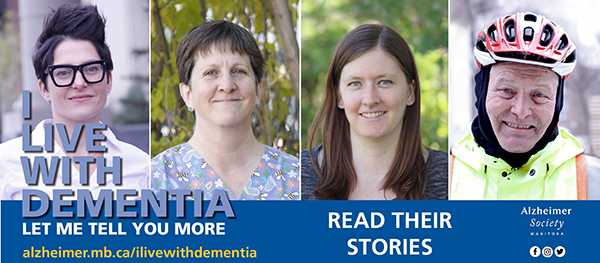In This Issue
January is Alzheimer’s Awareness Month!
Let Your Thoughts on our eNewsletter be Known!
Making the Best of a Pandemic Situation
Dementia Friendly Communities More Important Than Ever!
Where Should Your Family Member Live During the Pandemic?
Participants Needed for LGBTQI2S Study
Virtual Winter Programs and Support Groups
Thanks to our Holiday Campaign Donors!
January is Alzheimer’s Awareness Month!
If the faces above look familiar, it’s because each one of these individuals has told you their story in past years as part of the three-year #ilivewithdementia campaign.
For this year’s Alzheimer’s Awareness Month, they want to let you know how far they’ve come since you last heard from them.
Click here to read their stories on our Alzheimer’s Awareness Month page, where you’ll also find more information about living with dementia.
Will You Participate in our eNewsletter Survey?

We want to provide you with relevant, educational and helpful information about dementia. Please help us improve our monthly eNewsletter by filling out this survey. It will only take a few minutes of your time!
Click here to access the survey.
THANK YOU!
Making the Best of a Pandemic Situation
When the pandemic is over and things are back to “normal,” the family of Terry Law plans to have a big party, and the man of the hour will be Terry himself.
 Terry won’t understand what the celebration is all about – he was diagnosed with Alzheimer’s disease in 2016, and the disease has aggressively advanced. He doesn’t recognize his family, but that won’t stop all eleven of them from getting together to be by his side again.
Terry won’t understand what the celebration is all about – he was diagnosed with Alzheimer’s disease in 2016, and the disease has aggressively advanced. He doesn’t recognize his family, but that won’t stop all eleven of them from getting together to be by his side again.
Before the pandemic, the family would use a large multipurpose room at Terry’s care home that has lots of space for everyone, including four grandkids. “We’d bring in food and games, and we always had a good time together,” says Tara Liske, eldest daughter of Terry and his wife, Jan. “It will definitely be something we’ll be doing again when this is over!”
But for now, it isn’t easy. No one can visit Terry in his care home in Selkirk. Tara, her mother and her two sisters all live about 30 minutes away. They visit virtually – an arrangement Terry doesn’t understand, which makes any sort of communication or interaction with him difficult to sustain. And everyone, especially Jan, longs for physical touch.
Despite these challenges, Tara knows that her mom appreciates the virtual visits. Jan can see how her husband is doing physically, at a minimum. And she is able to call his care team any time to talk about his health.
Hopefully, when it’s safe to do so, Terry will be moved to a care home in Beausejour, where Jan lives.
“Before, when visiting was allowed, mom would go regularly, and she’d make a whole morning or afternoon of it. She could go any time, unannounced,” says Tara. “When Dad moves to Beausejour, she’ll probably go every day. She’ll pop in for visits on her walks, and she’ll be able to help feed him.”
In the meantime, the family is grateful Terry is in a safe place. “We’re thankful they aren’t allowing people to come in and potentially bring the virus into the care home,” says Tara.
They are confident that Terry is well cared for. “We’ve always said that the interactions we’ve seen with his caregivers go above and beyond anything we could expect,” says Tara. “They’re truly caring people, and we know he’s loved.”
Dementia Friendly Communities More Important than Ever!
 The Alzheimer Society promotes dementia friendly communities. We define this as a community that welcomes people with dementia, supporting them in the places where they work, live and play.
The Alzheimer Society promotes dementia friendly communities. We define this as a community that welcomes people with dementia, supporting them in the places where they work, live and play.
But how can we provide this support during a pandemic? With the cancellation of face-to-face programs and the closure of stores, recreation centres, churches and more, it is difficult for people with dementia and their caregivers to get out and about to participate in their communities.
This is a time for all of us to take a moment to think of ways to help the most vulnerable among us, and we need to think creatively to do so!
Let’s start with your street or your block or your country road. Pandemic or no pandemic, keeping a vigilant eye out for those who may be in need is important, especially in winter.
“I noticed a woman on the sidewalk on a minus 10 degree day. She did not have a hat or mitts, and she was only wearing a sweater,” says Nadine, who lives in a west Winnipeg neighbourhood. “I checked her out in my rearview mirror as I drove by, and I just knew she was in trouble.”
Nadine wheeled her car around and stopped to help. She was able to figure out where the woman lived and walked her home to safety.
Now that’s a sign of a dementia friendly community!
Other Dementia Friendly Community Actions
You may know a family in your area whose members are caregivers for someone with dementia. It’s now more important than ever before to pay attention to them. You could leave a note in their mailbox, including your name and phone number, to let them know you are available to help. Can you pick up groceries for them? Drop off their mail? Shovel their driveway?
It may even be appropriate to have a short sidewalk visit – with them in their doorway and you socially distanced on their walkway. Nothing beats seeing a friendly face, even when it’s cold outside!
You can also direct people to the Alzheimer Society – we offer virtual recreational and educational programs that can work to keep them occupied and engaged. Winter programming details will be coming soon.
The pandemic WILL be over at some point, and people will be out and about again in their communities. Until then, remember that we are all in this together, and helping each other is at the core of a dementia friendly community.
Difficult Decisions: Where Should Your Family Member Live During the Covid-19 Crisis?

During the pandemic, it’s not surprising that many people are concerned about family members in long-term care or in an assisted living situation. Doors to these facilities are often closed to visitors, and contact is limited, at best.
With the increased number of outbreaks and deaths in care homes, along with the physical, social and emotional effects of Covid-19 on seniors, you may be wondering how to make the best care decisions. Should a person with dementia stay at their facility? Should arrangements be made for them to move in with a family member or elsewhere?
The Alzheimer Society recognizes that long-term care staff are working under extraordinarily difficult conditions. As well, we know that families are struggling; they want to balance what may be a critical situation in the care home with the best interests of their family member. We also recognize that older adults, including those with dementia, are vulnerable for contracting Covid-19 and other diseases. Living in confined residences puts these individuals at a greater risk.
Below are two resources to help you work though some key considerations about care during the Covid-19 pandemic. They do not provide definitive advice, as each family situation is unique, but they offer ideas that can help in the decision-making process.
Should I go to live elsewhere or stay in my retirement/assisted living home?
Should I or my family member go to live with family or stay in the long-term care or nursing home?
Please note: While these resources were created for Ontario residents, we feel the advice is applicable in Manitoba, too.
This is an important time to access as much reliable and valid information as possible before making a decision. If you wish to talk things through with someone, call us at the Alzheimer Society – we’re here to listen. We can be reached at 204-943-6622, by calling your nearest regional office or toll free at 1-800-378-6699. Email us at [email protected]
Reaching Out for Insight into Care for LGBTI2S People with Dementia
Do you care for or identify as an LGBTQI2S person living with dementia?
If so, you may be interested in participating in a national study that seeks to better understand your unique experiences concerning how care provision and support in Canada can be improved.
 To learn about your experiences, the researchers are planning two confidential, virtual sessions with participants: a 30-minute introductory meeting and a two-hour focus group. (Focus group participants will receive a $50 Amazon e-gift card.)
To learn about your experiences, the researchers are planning two confidential, virtual sessions with participants: a 30-minute introductory meeting and a two-hour focus group. (Focus group participants will receive a $50 Amazon e-gift card.)
The researchers are looking for focus group participants who:
- Identify as lesbian, gay, bisexual, transgender, queer, intersex and/or Two-spirit.
- Live with a diagnosis of dementia OR provide unpaid primary care for LGBTQI2S people living with dementia and are at least 18 years of age OR identify as LGBTQI2S and provide unpaid primary care for a person living with dementia and are at least 18 years of age.
The research team welcomes and encourages participation of people with various interconnecting social identities, such as Black, Indigenous, people of colour and people who live in rural areas.
It is the researchers’ hope that the insights gathered from this study will positively influence LGBTQI2S people with dementia and their unpaid primary caregivers’ experiences of care and support within communities across Canada.
The research is funded by the Public Health Agency of Canada and has been reviewed and approved by the Ryerson University Research Ethics Board (REB 2020-349).
More Information:
To learn more and to sign up for the study, check the project website: https://egale.ca/egale-in-action/dementia-study/
For specific information, check out the two recruitment Posters:
Caregivers
People with Dementia
To address questions about this study, please contact the research team at [email protected] or one of the project leads:
Dr. Ashley Flanagan: [email protected]
Celeste Pang: [email protected]
Check Out Our Virtual Winter Programs and Support Groups!

The Alzheimer Society is offering virtual programs and support groups over the winter, and there is something for everyone! Here’s the best part: you can participate from the comfort of your own home, no matter where you live.
Online Education Sessions
Our online education sessions cover a wide range of topics – from safety at home to financial matters to end of life discussions. The sessions are geared towards helping people with dementia and their caregivers be confident on their dementia journey. Click here for more information and to register.
Virtual Minds in Motion®
The winter session of our Minds in Motion program is available online throughout January and February. This program attracts people with dementia and their care partners because it provides the perfect mix of fitness, socializing and brain challenging activities in a safe, supportive environment. Click here for dates and times and to register. Click here to hear from participants about the online format.
Virtual Support Groups
A variety of days and times are available for those interested in joining a virtual support group for care partners or for persons with dementia. These groups help connect people with others living in a similar situation during these uncertain times and to ensure that families continue to have access to support and information. Click here to register for a date and time that suits your schedule.
Remember: You Are Not alone.
We are here to help you and your family through these difficult times. You can reach a comforting ear by phone or get a quick response by email. Call us at 204-943-6622 (Winnipeg), 1-800-378-6699 (toll free in Manitoba) or email [email protected]
Thanks for Making our Holiday Matching Gift Campaign a Huge Success!
 Thanks to the generosity of our supporters, our holiday matching gift campaign raised $106,540.
Thanks to the generosity of our supporters, our holiday matching gift campaign raised $106,540.
That total includes $71,540 from 870 donors, along with $35,000 given by Neil Carlson, David Greenwood, Sean Lawton, Elden Wittmier and an anonymous donor. We were thrilled that these individuals stepped up to match your donations! To discover their motivations for doing so, click here.
Thank you to both Linda van den Broek and Brad McIntosh, who shared their moving stories for this campaign. You can view a video about Linda’s journey with her mother and mother-in-law here. You can read Brad’s story about navigating dementia with his mother here.
We are grateful for everyone’s support and commitment to the many Manitobans impacted by dementia and to the work we do to support them. We could not do this work without you.

